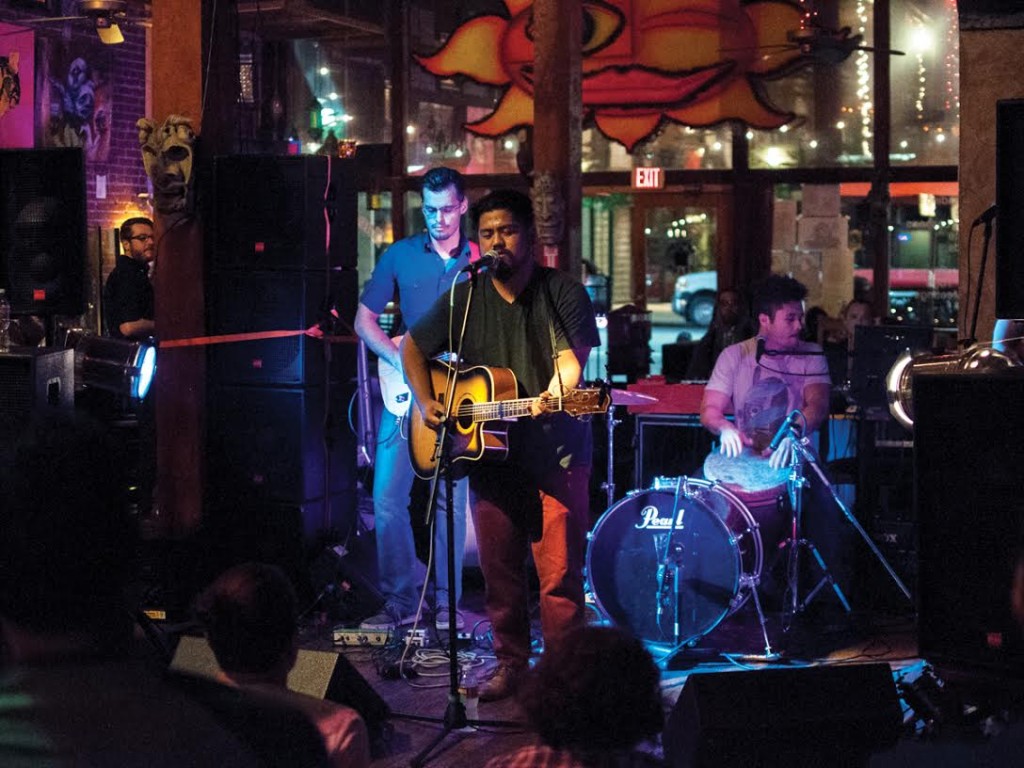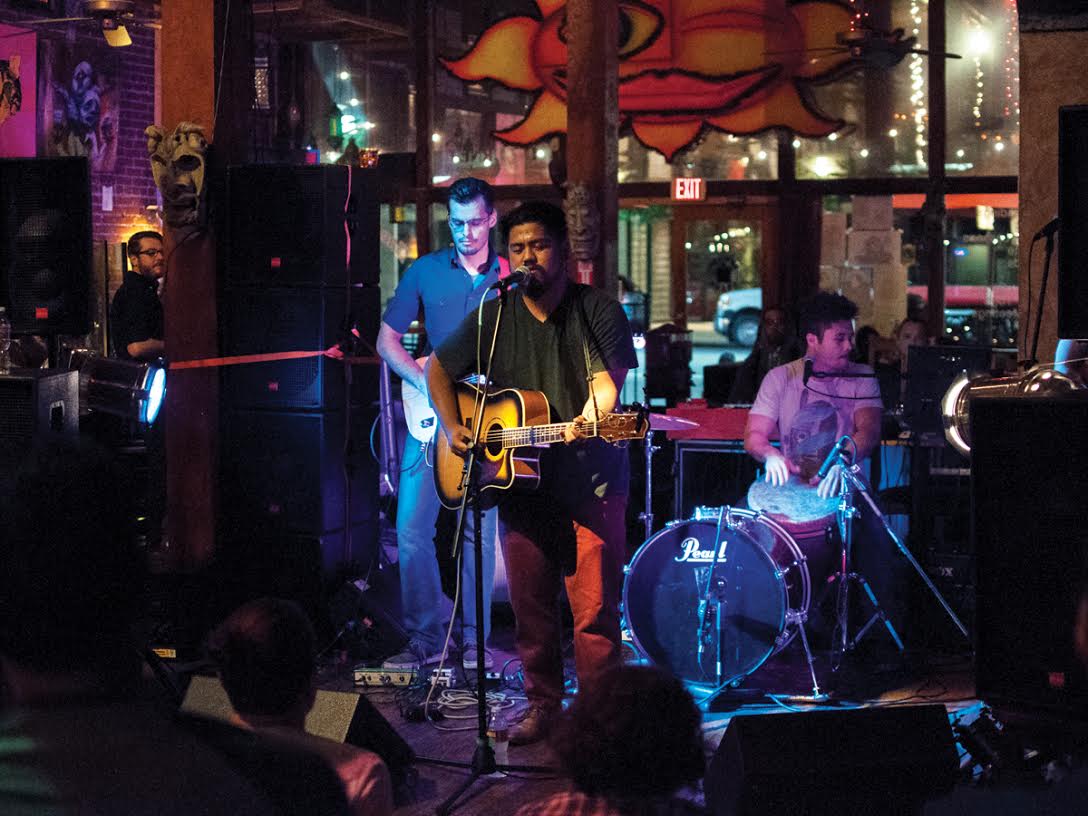
Introduction: A Call to the Arts
Ask a UCR student what they think represents a festival or a concert, and chances are they’ll conjure up hip-hop and EDM artists providing the beats for bodies to grind together in mosh pits denser than a mountain, an ample osmosis of THC rising above students’ heads and the all-too-familiar long lines and high prices of food trucks.
Replace the hip-hip and EDM with punk bands and indie solo artists, grinding mosh crowds with ironic mustaches and overgrown beards politely occupying each others’ company, abundant THC with abundant nicotine and a dry campus with Pabst Blue Ribbon and you have a quick snapshot of Saturation Fest. Sort’ve.
Starting in 2001 as a simple weekend event for local artists and musicians to show off in front of 100 or so passers-by, Saturation Fest has grown into a massive cultural milestone for Riverside and the Inland Empire, attracting well over tens of thousands of dedicated and appreciative fans. United by a “do-it-yourself” populist attitude, the three-day event holds a number of bands, workshops and artistic exhibitions open to the general public. Hosted by several venues, including Back to the Grind, Blood Orange Infoshop and Worthington’s Tavern, Saturation Fest was a display of Riverside’s artistic magic, all held together by a simple principle: you have a voice, and the world needs to hear it.
Back to the Grind: The Musician’s Den
Downtown Riverside’s go-to coffee shop Back to the Grind hosted several musical acts including The Lonely Hearts — or rather, just their lead singer. “Sorry, half of the band is currently missing,” she explained before filling in the band’s set time with her own solo. She chose slow, peaceful songs that allowed her to sing with power and grace. For about 20 minutes, Back to the Grind became a vintage, noirish ‘40s smooth jazz bar. Even without the rest of her band, Saturation Fest’s opening set began and finished in style.
Summon the Yeti performed for the second time at the festival. Led by lead singer and guitarist Charles Lenida, the indie group followed up their previous show last year with a powerful set that was evocative of Vampire Weekend’s round, indie sound.
Following them was long-haired band Castle Pines. With Leandro Barrientos as lead vocalist, they labelled themselves as an indie band, but with their difficult-to-decipher lyrics and wall of sound generated in each song, they were more reminiscent of definitive ‘90s bands like Blink-182.
Saturday’s performances were kicked off with Safety Net. The Palm Desert natives attracted a few curious attendees into the basement of the bustling coffee shop before putting on a spectacular show. Unfazed by the initially lackluster crowd, Safety Net played like true professionals, despite being together for a short period of time. Drummer Cliff Horn explained why this show was so special: “We’ve been playing together for exactly one year today, last year’s Saturation Fest is the first show we ever played officially as a band.”
The band possessed undeniable chemistry as they continued playing with confidence and ease. “I’ve been in other bands but this one is my favorite,” bassist Austin Lawrence expressed. Guitarist Carrick O’Dowd provided vocals, screaming out lyrics while the growing crowd bobbed their heads. As I glanced around the room, I noticed a family with two small children had entered. The little girls threw their hands up to their ears in protest of the wailing electric guitar and pounding drums, which proved to be a little too loud for their tastes.
During their set, Safety Net decided to attempt a tune they hadn’t played in a while. “Let’s not fuck this up,” Horn joked as they began what ended up being one of their best songs of the evening. Before finishing up, they announced that they were selling merchandise in the back of the room and encouraged the crowd to attend their next show in Claremont that night.
Next up was post-punk band The Lost Years. Comprised of friends Joey Revenge and Nigel Hazard, the band has been going strong for seven years. Despite a few technical problems during their set, the band proved to be extremely passionate and dedicated to their performance. Vocalist Revenge even jumped off the stage a few times out of pure enthusiasm. Hazard proved to be a solid guitarist, playing with ease and precision throughout the entire set.
Before performing a song called “I’m Free,” Revenge spoke about what it truly means to be free in America. “It’s much easier to be free in this country if you’re a white, straight Christian guy,” he said. The band tackled several topics, including the difficulty of having meaningful relationships in the age of social media with a song called “Keep It,” which Revenge dedicated to people who “use the Tinder.”
The Lost Years are hoping to release an EP during the summer as well as another project entitled, “For Ryan” that will be dedicated to their drummer who passed away. “All of the songs will be songs that we made with him,” Revenge explained. Hazard switched his electric guitar for an acoustic guitar to end their set on a softer note, proving that the band was not only talented, but versatile.
The Lost Years were followed by rock band Flying Brains. They continued the hard-rock sound that the bands before them produced and drew a considerably large crowd. Several people stood directly in front of the stage and danced as the four band members encouraged them to move closer. The band was dripping with sweat by the time their set was over, proving that they put their all into their performance.
Highlight: Andres Valenzuela
Andres Valenzuela was the second performer to take the stage at Back to the Grind on Friday as a solo artist. Given that most of the day’s performers were bands, he stood out armed with his voice and banjo. However, that merely lent him more credence, as he provided just as much entertainment, if not more than his contemporaries. His instrument gave him free range for his music, as his styles ranged from shouting about women and high living in fast-paced, hip-swiveling ‘50s rockabilly to a more subdued and return-to-roots rhythm of soft-spoken folk. He sung of the positive vibes and good times that embody Saturation Fest.
“Pete Seeger used to say that music is a weapon,” Valenzuela said in an interview. “It can reverberate and explain your problems, and it can heal your problems, but it also can solve your problems.” Valenzuela is a firm believer in music’s democratic spirit and its appeal to all corners of society. “Music can move you in such a way that it doesn’t matter what language you speak or what color or class you are—(music is) something innate.”
Valenzuela noted that he tries to play at Back to the Grind every other week. “I do the open mic nights most Tuesdays,” he stated. While he’s attended Saturation Fest before, this was his first time performing at the event. “I just moved (to Riverside) two or three years ago.” Born in LaSalle, Illinois and a former resident of Chicago, Valenzuela delved into how his background influenced how he plays. “I started to play guitar around 12 or 13,” he began, before explaining that he switched to the banjo, a recent instrument of his. “I got bored about it because it’s difficult to sing and play guitar,” he said. “It’s just a really ridiculous instrument.” Valenzuela went further by clarifying his musical tastes and styles, explaining that when genre names like ‘folk-punk’ are used, “‘folk’ (becomes) a moniker for what it really is. I really like old-time banjo players, and I fuse that with R&B and Mowtown, people that influenced me when I was growing up.”
Ultimately, Valenzuela was very excited for what Saturation Fest provides for young, burgeoning artists.
“The music scene here is ridiculous. There’s so much talent here; it’s dumb how much talent is here.”
Highlight: Don’t Kick Jimmy
Centering around lead guitarist and vocalist Matthew Kijak, bassist Scott Oakdale, drummer Phillip Greenwood and featuring Spenser Kalnin on the trumpet, Don’t Kick Jimmy’s sound is as exciting as their name is strange. Their performance as the second to last band at Back to the Grind on Friday was an overwhelming ecstasy of sound. Their original hits were complete with their trademark fusion of almost every musical style possible, ranging from rock, hip-hop, soul and funk. Combined with a few classic covers of artists like Death Cab for Cutie and The Notorious B.I.G., it was an easy pull for their astonishing set to be the evening’s most thrilling. As the coffee shop lights returned and the crowd sat down to let its collective heart rest from the excitement, it was plain to see that they didn’t just help end the night with a bang—they were the night.
Drummer Phillip Greenwood talked extensively about the band.
“Our name kinda just came,” he replied when asked how Don’t Kick Jimmy’s name came to be. “It started as a joke and just stuck, which is okay because it’s our music that matters.” Greenwood went into detail about the band’s diversity in genres and styles. “Our singer Matthew really likes east coast blues, and Scott is a huge funk guy. He loves Red Hot Chili Peppers and George Clinton.” As for himself, “I grew up listening to and performing jazz and church music, and its influence is there when we play. Our different backgrounds is what makes Don’t Kick Jimmy what it is.”
“The band was put together about three years ago,” Greenwood said. “Matt and Scott went to school in Claremont, where I was introduced to them by a friend. They were looking for a drummer, I was looking for people to work with, we did a gig together and that’s how Don’t Kick Jimmy started.” They have yet to release a full studio album but are working on one in the midst of their various performances. “We’re signed with My Block Records, and we’re expecting to put out our debut album hopefully this year, maybe by November or December,” he explained.
Their ultimate goal is to leave their mark in music by bringing something new to the music scene.
“This is our mutual dream,” he said.
Blood Orange Infoshop: The Heart of Saturation Fest
The heart of the DIY movement is the belief that individuals possess the capacity to grow, change and create on their own, away from the crutches that society offers. And because that attitude is what makes Saturation Fest possible, the Blood Orange Infoshop is its heart.
Blood Orange Infoshop is an open and collaborative organization made up of the DIY ethic, anarchist and anti-authoritarian politics and artists of all ages waiting to leave their first marks on the world. Located in the Historic Arts Building in downtown Riverside, Blood Orange Infoshop’s interior is made up of surreal imagery hanging along banisters and pillars, and self-published authors with their own zines, comics, pamphlets and stickers.
The topics in all the different published pieces ranged from conventional political material to the most strange and stare-inducing art. One of the more peculiar pieces was “Secret Bully” by Cynthia Ann. It documents the first 30 years of her life spent living in her home in New York City where, on first page, capturing the “unconditional love for a place that both embraces you then pushes you down in one fluid motion—(which) is something worth discussing.”
Another highlight of the zine table was “Confluence,” a 20-page collaboration of essays and poetry that examines the uses of power in modern society with a ‘grrl’ power attitude.
With a diverse line of material permeating their location, Blood Orange Infoshop was the heart of Saturation Fest by physically embodying the idea that individuals hold the power to better the world.








